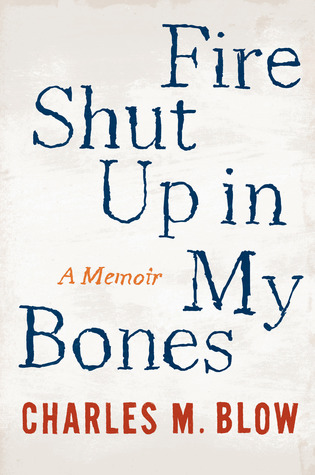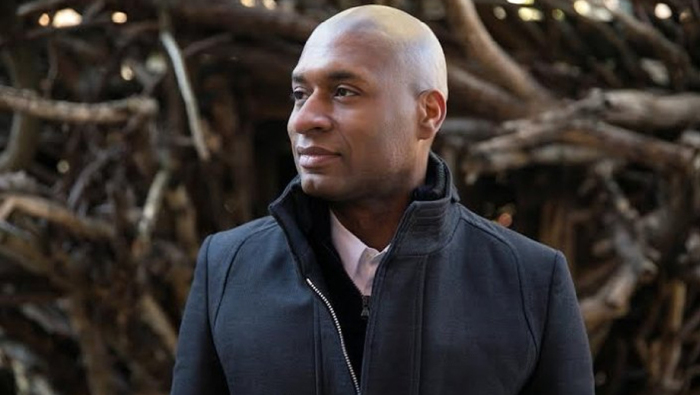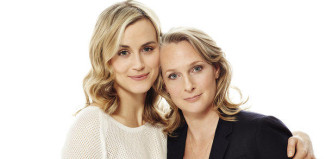Charles Blow, a New York Times op-ed columnist and CNN commentator, will speak this weekend at the Texas Book Festival in Austin about his new memoir, Fire Shut Up in My Bones. With vivid descriptions, insightful wisdom and complete vulnerability, Blow deftly relates his sexual abuse as a child by a cousin and an uncle, his impoverished upbringing in a segregated rural Louisiana town in the 1970s, his bisexuality, and his journey to self-acceptance.
A Grambling State magna cum laude graduate (mass communications, 1992), Blow worked in graphics and design for The Detroit News, National Geographic, and The Times before shifting to writing in 2008. His column now appears every Monday and Thursday. Blow lives in Brooklyn with his three children.
His discussion on using storytelling to come to terms with painful experiences is Saturday at 11 a.m. in the C-SPAN2/Book TV Tent.
Tell us about the life of a writer.
Most of my writing time is spent on the column. One of the reasons that memoir appeals to me is that most of the research is already in my head. I could just write in the middle of the night when everybody went to sleep. The book became a kind of release. It was my time at night to play with the crayons. It was a style of writing that just didn’t fit the column. I used to be an information designer, and I would come home and paint. I needed the more creative outlet at night because I was locked into a more formulaic box during the day. This was that more creative outlet for me as a writer.
Give us a snapshot of growing up in rural Louisiana in the 1970s.
Gibsland was quite literally Gib’s Land, because it had been the plantation of a man named Gibs. It was a segregated town—that’s how people had arranged themselves. Almost all of the white kids had left the school system and gone to a private academy that sprung up after Louisiana had been forced to integrate its schools. Most of the black people I knew lived in some gradation of poverty, even if they would not have called it that at the time.
 In your book, you write about a pivotal moment in your life when you were driving to kill your cousin: I had to make a choice: drive forward on the broad road toward the unspeakable or take the narrow highway exit. I don’t know which chose, my head or my hand, but I exited and drove through my college campus, thinking about all that I had accomplished. Me. With my own mind and grit. I had reinvented and improved myself. I was a man—a man with a future. I couldn’t continue to live my life through the eyes of a 7-year-old boy. What was going through your mind and heart at that time?
In your book, you write about a pivotal moment in your life when you were driving to kill your cousin: I had to make a choice: drive forward on the broad road toward the unspeakable or take the narrow highway exit. I don’t know which chose, my head or my hand, but I exited and drove through my college campus, thinking about all that I had accomplished. Me. With my own mind and grit. I had reinvented and improved myself. I was a man—a man with a future. I couldn’t continue to live my life through the eyes of a 7-year-old boy. What was going through your mind and heart at that time?
It was just a flood of emotion and unresolved issues surrounding childhood sexual abuse. If you don’t deal with that pain, it has a way of coming back to the surface. I write that betrayal doesn’t stay buried. It’s still alive and scratching its way back to the surface. That moment was an expression and explosion of all of that pain and questioning and damage coming to the surface.
What did you feel that you had accomplished at that time?
I had learned valuable life lessons: that I was strong enough to persevere, that I could change myself to some degree to who I saw in my mind’s eye, and that success was possible for me—not just financial success, but success as a human being, the success of learning to love yourself, being loved by others, that your abuser does not have ultimate power over you, that you do not have to live your life through the eyes of a 7-year-old child.
How or from whom did you learn that? That’s almost the Holy Grail.
I’m not sure I can track it back to a person or a particular event. It feels like the culmination of lessons learned and experiences in life. Every little thing—like in gardening, learning that you have to break up the soil for the seeds to take root. Life and nature is sometimes cruel, but it is incredibly instructive, because you see things destroyed and then blossom from that destruction. And watching my mother go through the process of divorcing my father and going back to school. Seeing that education was not simply an abstraction but a way to maturely change your circumstances. Seeing her completely reinvent herself. Understanding that as long as you have breath, you have the ability to change and to grow.
What are some of the deliberate ways you transformed yourself?
Some are kind of silly. There was a moment where I wanted to be the governor of Louisiana. I thought, “How do I make myself seem more sophisticated than this kid from the middle of nowhere?” So I started to emulate two people: Martin Luther King and Prince Charles, two strange people to put in the same bucket. I had always looked up to Martin Luther King, a man who had completely given himself over to a purpose. I thought that was incredibly noble and that if I could be more like him, I would absorb some of that nobility. Around the same time, Prince Charles married Diana. I didn’t know who Prince Charles was, but I thought, “It’s a prince, and his name is Charles. My name is Charles, so I could be a prince!” I watched how he comported himself: the way he stood, the way he walked, the way he conducted himself in interviews. But also it was bigger things, like looking at education as a concrete ladder out of my circumstances.
You write that being attracted to both men and women seemed harmless, but that it almost ruined your life. When did you arrive at “I am who I am,” and how has life changed for you since then?
The beginnings of that happened the night where the book opens, when I was 20 years old. I don’t know how life changed other than it helped me just relax and be myself. It feels so natural to simply be yourself, to be able to share that with the people who you love and who love you, and to understand that when someone loves you and you love someone else, that that love is wide enough and deep enough and sufficient enough that it will always be love.
Talk about the battles bisexuals face from the voices in their heads that come from voices in society. I just say, “I’m going to be me,” and even if that’s a group of one, I’m going to be myself, because that’s the only thing I know how to do.
There’s a lot of mythology built up around it, that either it doesn’t exist at all, or if it does exist it is only people who are precisely in the middle and can go any which way the wind blows. I’m sure that some people are like that. It’s just that that’s not my expression of it or how I understand it.
I think the bigger part is people wanting to erase the identity itself because it pushes them out of a comfortable binary, which is an easier way to understand things. It requires no work on your part if you’re not experiencing that yourself, and so in a way it’s lazy to not want to acknowledge it.
I grew up with this idea of “passing,” where—particularly before the Civil Rights era—people who were of mixed race but could pass as white often would because they wanted to experience white privilege and avoid black oppression. I think a lot of people who have a sense of being in the middle also “pass” because they want to avoid the oppression and experience some privilege, whether it be a normative privilege or even to some degree the community-based inclusion of complete homosexual identity.
I just say, “I’m going to be me,” and even if that’s a group of one, I’m going to be myself, because that’s the only thing I know how to do.
My favorite line in the book is this beautiful sentiment: No one could strip me of my value and dignity, because no one had bestowed them. These things came into the world with me. Why is it so difficult to really feel that truth, and how did you make the shift in yourself?
I don’t know how a person really comes to recognize self-worth. I wish I understood the mechanisms. Maybe that would be the next book I write—how to do it! I don’t know how you do it. I just know it must be done. I know that learning to love and value yourself is probably the highest moral obligation you have to yourself. To deny yourself that love and acceptance is to deny truth. To deny truth is to live a lie. And the idea of living a lie is not to be alive.
Interview by Jana Hunter





































